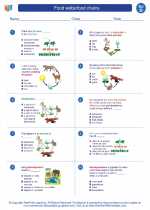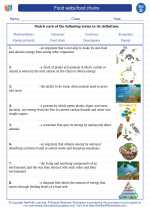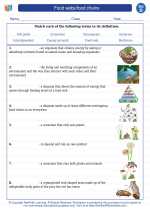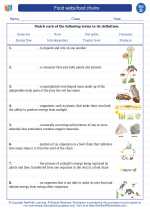Food webs/food chains -> vitamins
Vitamins: Explained
Vitamins are essential organic compounds that our bodies need in small amounts to function properly. They play a crucial role in various bodily functions such as metabolism, immunity, and overall health. There are 13 essential vitamins that can be categorized into two groups: water-soluble vitamins (B-complex vitamins and vitamin C) and fat-soluble vitamins (vitamins A, D, E, and K).
Water-Soluble Vitamins
B-complex vitamins include thiamine (B1), riboflavin (B2), niacin (B3), pantothenic acid (B5), pyridoxine (B6), biotin (B7), folic acid (B9), and cobalamin (B12). These vitamins are easily absorbed by the body and are not stored in large amounts, so they need to be consumed regularly through a balanced diet. Vitamin C, also known as ascorbic acid, is another water-soluble vitamin that is important for collagen formation, iron absorption, and immune function.
Fat-Soluble Vitamins
Vitamins A, D, E, and K are fat-soluble vitamins, meaning they are absorbed along with fats in the diet and can be stored in the body's fatty tissues. Vitamin A is essential for vision, immune function, and cell growth. Vitamin D helps in calcium absorption and bone health. Vitamin E acts as an antioxidant, protecting cells from damage. Vitamin K is necessary for blood clotting and bone metabolism.
Study Guide: Vitamins
Now that we've covered the basics of vitamins, here's a study guide to help you understand and remember the key points:
- What are vitamins?
- Vitamins are essential organic compounds required in small amounts for various bodily functions.
- How are vitamins categorized?
- Vitamins are categorized into water-soluble (B-complex vitamins and vitamin C) and fat-soluble (vitamins A, D, E, and K).
- Give examples of water-soluble vitamins and their functions.
- B-complex vitamins (B1, B2, B3, B5, B6, B7, B9, B12) and vitamin C. Functions include energy production, immune support, and collagen formation.
- Name the fat-soluble vitamins and their roles in the body.
- Vitamins A, D, E, and K. Roles include vision support, bone health, antioxidant protection, and blood clotting.
- Why is it important to consume a balanced diet to obtain vitamins?
- Since vitamins are essential nutrients that the body cannot produce in sufficient amounts, they must be obtained through a varied and balanced diet.
By understanding the roles and sources of various vitamins, you can make informed choices about your diet to ensure you get an adequate intake of these essential nutrients.
.◂Science Worksheets and Study Guides Fourth Grade. Food webs/food chains

 Activity Lesson
Activity Lesson
 Worksheet/Answer key
Worksheet/Answer key
 Worksheet/Answer key
Worksheet/Answer key
 Worksheet/Answer key
Worksheet/Answer key
 Worksheet/Answer key
Worksheet/Answer key
 Vocabulary/Answer key
Vocabulary/Answer key
 Vocabulary/Answer key
Vocabulary/Answer key
 Vocabulary/Answer key
Vocabulary/Answer key
